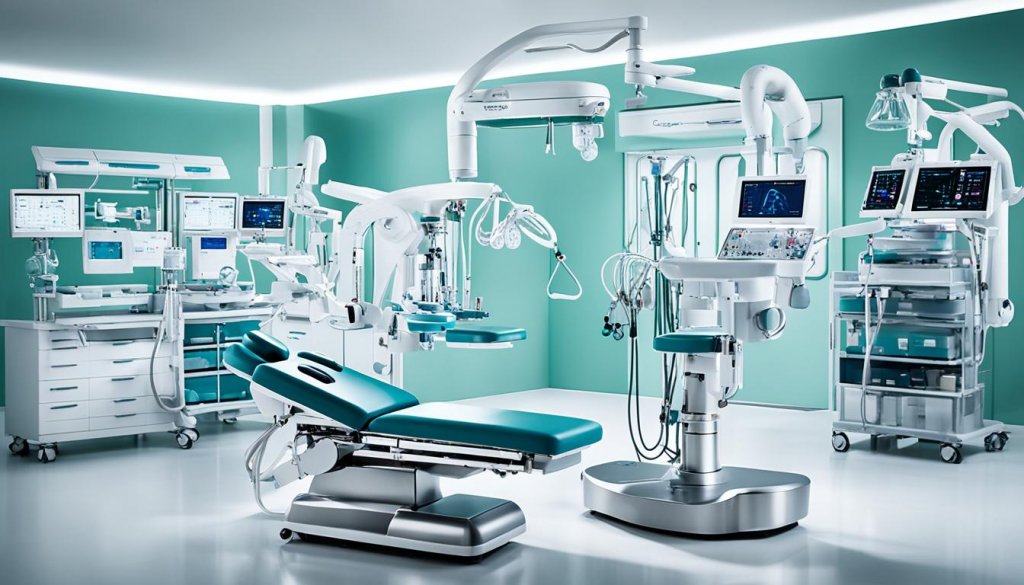Starting out in the medical equipment world feels fulfilling. It’s an industry that matters because it helps healthcare providers and their patients. Yet, creating a thriving business in this area is challenging. It calls for detailed planning, a focus on high quality, and a passion for new ideas.
Today, the medical equipment field is vital. It makes sure healthcare givers have the tools they need to care for patients. Look at the numbers – the market might hit $160 billion by 2025. This growth is a chance for people like me, eager to change the world through innovation.

In this post, I want to give you key advice on starting a successful medical equipment business. I’ll talk about picking the right path and getting the needed permissions. With my insights and tips, you can make your business dreams come true.
Key Takeaways
- The medical equipment industry offers significant growth potential, with the market size expected to reach $160 billion by 2025.
- Launching a successful medical equipment business requires careful planning, attention to detail, and a deep understanding of the healthcare landscape.
- Identifying a unique niche or underserved market, developing a targeted marketing strategy, and securing the necessary licenses and permits are crucial early steps.
- Choosing the right business structure, securing funding, and building strong relationships with reliable vendors and distributors are essential for long-term success.
- Embracing technological advancements, prioritizing customer relationships, and navigating the complex reimbursement landscape can provide a competitive edge in the industry.
Choose a Niche or Underserved Market
For those aiming to start their own medical equipment business, finding a unique market is key. It could be a specific medical field, like orthopedics, or a location lacking equipment access. By knowing where your skills lie and spotting gaps in the market, you can make your mark. This approach helps your business shine among competitors and meet what healthcare providers need.
Identify Your Expertise or Unique Selling Proposition
Your past and what you bring to the table are crucial. Maybe you’ve worked in healthcare, spotting the needs firsthand. Or maybe you’ve created a product that’s a game-changer in the field. Know what sets you apart and how it helps those in the healthcare business. This lets you highlight your know-how or innovative items to grab your target customer’s attention.
Analyze Market Gaps and Competitors
Doing a deep dive into the market helps you find your place. Look at what others in the medical equipment world are doing. Find where they aren’t quite meeting the needs and where you can step up. Understanding your rivals shows you how to be better. This knowledge guides your product improvements and advertising, aiming to win more customers.
Develop a Targeted Marketing Strategy
Understanding your niche and what makes you special is just the beginning. Now, it’s about getting the word out. Decide the best ways to connect with healthcare pros, whether through shows, online ads, or direct contacts. Create marketing that shows off your gear’s benefits. This strategy can get your name out there and draw in customers.

Determine Your Business Structure
When starting a medical equipment business, choose a legal structure carefully. Your decision affects how you do business, your taxes, and growth chances. Look at the advantages and disadvantages of each structure before picking one.
Evaluate Business Entity Options (LLC, Corporation, etc.)
Think about if you want a Limited Liability Corporation (LLC), C-Corporation, or S-Corporation, based on your goals and how you plan to finance. LLCs are good for small medical equipment firms because they protect your assets and let you run things flexibly. C-Corps let you sell stock to raise money, and S-Corps might save you money on taxes if you’re small. It’s smart to talk with an accountant to see which type fits your business best.
Understand State-Specific Requirements and Fees
Every state has different rules and costs for medical equipment businesses. You must know about things like yearly reports and fees to pick the right business type and follow the law. Make sure to look up the laws for the state you’re setting up in to make a good choice.
File Beneficial Ownership Information Report
When you set up your medical equipment business, you might have to file a beneficial ownership information (BOI) report with the U.S. Department of the Treasury’s Financial Crimes Enforcement Network (FinCEN). This rule, starting on January 1, 2024, affects most LLCs and corps. It’s key to know and follow this rule to keep your business running legally and smoothly.
Secure Necessary Licenses and Permits
When you start a medical equipment business, getting the right permits and licenses is important. Just setting up an LLC or a corporation is not enough. You still need to get the permits and licenses required for your business to run legally.
Identify Required Business Licenses
Use a tool like BizFilings’ Business License Wizard to find out what you need. This wizard helps by looking at where your business is and what it does. It then tells you the licenses you’ll need. But it’s also wise to double-check with your local and state offices.
Understand License Fees and Renewal Processes
The cost and how you renew your business’s licenses can change from place to place. Some fees might depend on how much money your business makes. Others might have set prices. Knowing when and how to renew these permits is key to keeping your business running smoothly.
Fund Your Medical Equipment Business
Getting the right funding is key to starting a successful medical equipment business. When you look into financing, make sure you understand how it will affect your budget now and later on. This clarity is vital for your business planning.
Explore Financing Options (Bootstrapping, Loans, Investors)
A medical equipment business can be funded in several ways. These include using your own money, getting small business loans, finding investors, or using crowdfunding. The best option for you will depend on your specific business needs and goals. Consider each option’s benefits and disadvantages to make the right choice.
Prepare a Comprehensive Business Plan
You’ll also need a solid business plan to get financing. This plan should explain your market, what makes your business stand out, your financial expectations, and your business strategy. A well-crafted plan shows lenders or investors the potential of your business. Take the time to make a plan that highlights what makes your business special in the healthcare field.
Evaluate Costs and Potential Return on Investment
When picking a funding option, look closely at your business costs and potential profits. This analysis is crucial for making smart financing decisions to keep your business healthy in the long term. A detailed budget that includes everything from buying equipment to advertising can guide your funding choices.
Identify Reliable Vendors and Distributors
A successful medical equipment business relies on strong partnerships. These include manufacturers, distributors, and vendors. These partners produce, supply, and deliver the products to healthcare providers. It’s important to choose suppliers and vendors based on their innovation, quality, and communication.
Assess Vendor Innovation and Quality Standards
Find vendors and distributors known for innovation and quality. They should have plans for new product development and maintain high standards. Working with such partners ensures you provide the latest, reliable medical equipment.
Evaluate Communication and Expertise
Good communication is key with vendors and distributors. It’s crucial they’re transparent and understand the market. Choosing knowledgeable partners offers insights and support in this competitive field.
Consider Delivery Systems and Logistics
Efficient delivery ensures products reach healthcare providers in good shape and on time. Look into the vendor’s inventory, delivery methods, and the reliability of their supply chain. A smooth distribution plan guarantees excellent service for your clients.
Build Your Brand and Market Presence
After setting up your medical equipment business, the next step is to focus on your brand and market. You should aim to create a strong brand and grow your presence in the market. This means making a great website and marketing materials that stand out.
Develop a Strong Online Presence (Website, Social Media)
Start by creating a website that is both professional and easy to use. This site should highlight the medical equipment you sell. Your site must also be easy to find on search engines. This helps healthcare providers discover and learn about your products. You should also use social media to talk about your brand more. Being active on social media helps you stay in touch with your customers.
Create Compelling Marketing Materials
Make sure your marketing materials show off what makes your products special. Talk about how your products help with healthcare and improve efficiency. Use real-life stories from happy customers to show that your products work well. This makes your brand more trustworthy.
Utilize Targeted Advertising and Networking
Have a clear plan to advertise directly to healthcare providers. Choose the best ways to reach them, like through trade shows, online ads, or social media. It’s important to meet with people in your industry face-to-face, at events or conferences. This is a great way to make new contacts and show what you can do.
By strengthening your brand, creating a compelling online presence, and targeting your marketing, your medical equipment business can grow and succeed.
Medical Equipment Business
Working in the medical equipment industry means following strict rules.
You must obey many rules to assure your products are safe and of good quality. It’s crucial to keep up with new rules in your area. Make sure your products have all the needed certifications and approvals. Check your business often to ensure all steps are up to standard. Everything from storing items correctly, to labeling and packaging, must be right. Not following the rules can hurt your business and lead to legal trouble.
Understand Industry Regulations and Compliance
Regulatory efforts should focus on many parts of your business like manufacturing and quality. It’s key to have strong quality control measures. This makes sure your medical equipment is safe and works well. You need a plan to handle complaints, fix any issues, and recall products if needed.
Develop Quality Control Processes
Managing your inventory well is very important.
Set up a clear system to keep track of items, check when they expire, and make sure they are available when needed. Good inventory management can stop shortages, keep products in good condition, and make your business run smoothly.
Implement Efficient Inventory Management
Prioritize Customer Relationships
In the medical equipment business, strong relationships with customers are key. Healthcare providers need your products for top-notch patient care. It’s crucial to earning their trust for long-term success. This means offering great
Offer Educational Resources and Training
Help your healthcare provider clients by sharing educational materials and training. This can guide them in choosing wisely and using your equipment well. It shows you care about their success, earning you trust as a valued partner.
Gather Customer Feedback and Adapt Accordingly
Listen to your healthcare clients’ feedback and adjust your services and products accordingly. Gathering opinions through surveys, interviews, and more is vital. Make changes that show you are meeting their evolving needs to keep the strong bonds.
Embrace Technological Advancements
Technology boosts your medical equipment business in today’s fast-changing world. By using a top-notch e-commerce system, healthcare providers can easily order and track shipments. This makes the buying process smoother for them and more convenient.
Implement E-commerce and Online Ordering Systems
Having an e-commerce platform is a win for everyone. It gives healthcare clients a simple way to get the equipment they need. This system cuts down on mistakes and speeds up order processing, making it a better experience for all.
Utilize Data Analytics for Informed Decision-Making
Using data analytics can offer a deep look into what customers want and when. With this info, you can smartly tweak your medical equipment e-commerce site, online ordering, and inventory to suit their needs better. It’s like having a crystal ball for business.
Explore Automation and Streamlining Opportunities
Automating finances and payments can cut out a lot of the traditional paperwork hassles. And that’s not all. Look into medical equipment automation for smoother operations and quicker response times. This focuses on boosting your service efficiency for healthcare clients.
Develop a Strong Reimbursement Strategy
A good reimbursement strategy is a must for medical equipment companies. It’s all about showing the worth of your devices and the price insurers should pay. This involves proving your product really helps patients and saves money.
Getting your product out there can take 5 to 7 years. So, it’s smart to plan early. Definitive Healthcare is great for figuring out who’s who in the payer world. They can help you pick the right payors for your plan.
Understand Payor Approval Processes
Really understanding how new codes are made is key. You should know why your product needs a new code. Plus, if it’s really different from what’s out there.
Matching your proof with what the payors want is vital. This is how you make sure they’ll pay for your medical equipment.
Investigate Code Development and Requirements
Linking your team’s work to create evidence with other departments is crucial. This includes the research, legal, and medical side of your company. It helps you meet the rules of the FDA and what payors need to see.
Also, the price you set should consider how much payors are willing to pay. Your sales and marketing teams should work together on this.
Align Clinical Evidence with Payor Requirements
Bringing your evidence together with different teams is very important. It not only meets FDA and payor standards but also influences your price. Work with all your teams to make a strong plan.
Conclusion
To start a medical equipment business, it’s crucial to cover many areas. These include strategy, how things run, and rules to follow. By using the guidance in this advice, I can aim for my business to do well for years in the lively medical gear field.
Remember, getting it right is about knowing your stuff, creating new things, and working with others. With a good plan and putting it into action, I can work through introducing my medical gear and help patients. The medical gear field is full of chances, and by being on top of things, flexible, and caring about what customers need, I can make a thriving company that changes healthcare for the better.
It’s vital to keep your eyes open all the time, keep learning about the industry, and be ready to change to meet what health workers need. Using the latest tech, making sure you follow the rules, and building strong ties with customers and others in the business will help create a solid medical gear company. This way, we can really help people’s health nationwide.
See how FieldAx can transform your Field Operations.
Try it today! Book Demo
You are one click away from your customized FieldAx Demo!
FAQ
How can I establish a unique niche or identify an underserved market for my medical equipment business?
To find a unique niche, look at what you know well in the medical field. Then, see what the market needs. You might find gaps where you can provide special equipment or better medical supplies.
What are the key factors to consider when choosing the right business structure for my medical equipment company?
Think about whether an LLC, C-Corp, or S-Corp is best for your business. Look at tax rules, how you raise money, and what you need to follow. Choose the one that matches your needs closely.
What licenses and permits are required to operate a medical equipment business?
You’ll likely need a general business license, a sales tax permit, and certain industry certifications. It depends on where you are. Make sure to check all state and local rules before you start.
What are the key considerations for finding reliable suppliers and distributors for my medical equipment business?
Choose suppliers and distributors who focus on quality and know their medical stuff. They should deliver on time and work well with you. Good partnerships with vendors are key for your business’s success.
How can I develop a comprehensive marketing strategy to effectively reach healthcare providers?
Use different marketing ways to connect with healthcare providers. These might include trade shows, online ads, and social media. Make sure your marketing materials clearly show why your products are special.
What regulatory compliance and quality control measures are essential for a medical equipment business?
Stick to safety and quality rules in the medical equipment field. Have strong quality checks in place, handle complaints well, and be ready to recall products if needed. Following the rules keeps your business safe and respected.
How can I leverage technology to enhance the customer experience and streamline my medical equipment business operations?
Start by letting customers order and track their products online. Use data tools to understand what customers want and how they buy. This can help you manage what you offer and the prices.
What are the key considerations for developing a strong reimbursement strategy for my medical equipment products?
A good reimbursement plan is vital. Show your product helps both medically and financially. Make sure your clinical evidence matches what payors want. This will help you get the right price for your products.
Author Bio
Co-Founder & CMO at Merfantz Technologies Pvt Ltd | Marketing Manager for FieldAx Field Service Software | Salesforce All-Star Ranger and Community Contributor | Salesforce Content Creation for Knowledge Sharing






